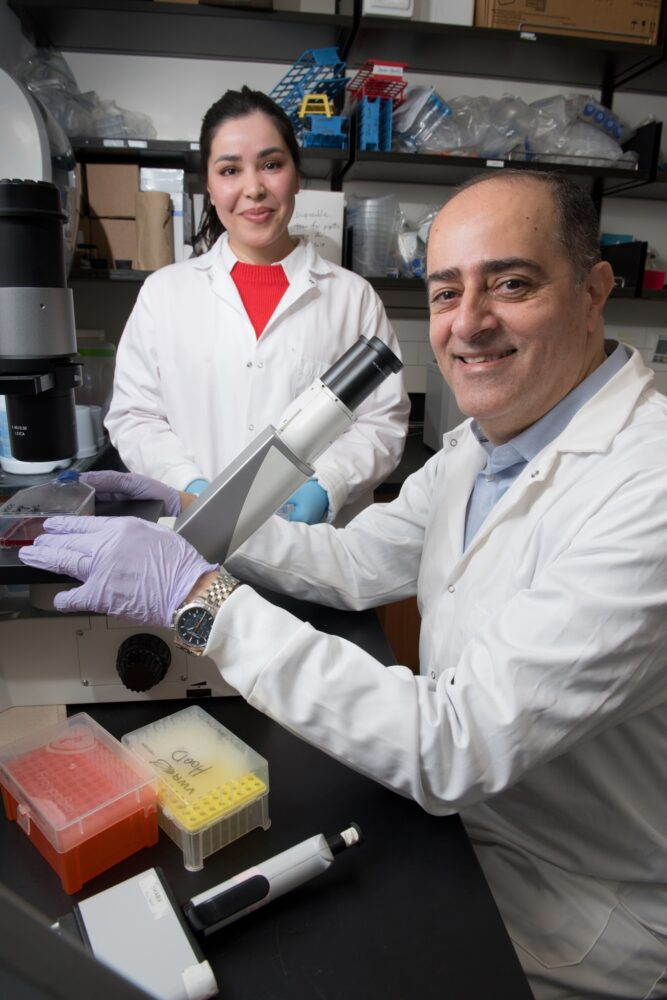In Mashhad, Iran, Dr. Fatemeh Fazel was an early-career veterinarian when she saw the devastation of avian influenza up close: swollen bodies of lethargic chickens, signs of nerve damage and sudden deaths.
In the late 2010s, avian influenza outbreaks swept Iranian provinces, upending regional economies in a country that produces the most poultry meat in the Middle East. Infected birds led to the disruption of food markets, meat and egg prices exploding, loss of food security in vulnerable socioeconomic groups - eerie parallels to what's happening in North America today.
"That time was the moment I decided my future path," Fazel says. "I started reading many publications by the University of Guelph. And I realized that U of G is a hub for avian flu research. It is where I wanted to be."
In January 2021, Fazel arrived in Canada to complete her PhD in pathobiology under the guidance of Dr. Shayan Sharif, one of the world's leading avian flu researchers, in pursuit of a vaccine capable of protecting birds.
"This work is giving us vaccine platforms that can help us fight back - to be prepared and respond with new solutions," Fazel says. "What makes the University of Guelph so unique is that it brings international and domestic students alike to work and focus on these big, real-life challenges."
Searching for the perfect vaccine for birds
Canada does not currently vaccinate its commercial poultry against avian influenza. Instead, the country emphasizes strategies to control outbreaks, surveilling animals and culling infected flocks methods that can contain disease but cannot provide widespread immunity.
This makes the search for the "holy grail" of vaccines, as Sharif puts it, especially pertinent. His lab works on a solution "that can prevent clinical signs, stop infection and prevent shedding of the virus in the environment," says the Ontario Veterinary College professor.
These vaccine platforms can be injected into chickens, applied as a nasal spray or delivered straight into eggs, days before they hatch.
Fazel is one part of this bold pursuit. Her work focuses on a vaccine capable of combating low pathogenic avian influenza (LPAI), which is separate from the highly pathogenic version, HPAI, dominating headlines now.
She believes, however, the learnings can still apply, especially as her tool of choice, the mRNA vaccine platform, is a highly adaptable solution refined over years of research. It is specifically designed to address viral mutations.
"It is a platform that has been around for three decades now," she says. "But one of the reasons I think it is perfect for avian influenza is how easy it is to design for a virus that keeps changing over time."
"Instead of starting from scratch," Sharif adds, "you make adjustments for a new virus, and your mRNA vaccine becomes suitable for a new strain."
Fazel's days are now spent perfecting the mRNA vaccine.
First, she sequences a virus's genetic code, focusing on a part that makes a key protein - an antigen that can prompt an immune response. She then crafts a piece of mRNA that carries critical codes for the birds to make this antigen themselves. Finally, she injects the vaccine into the muscles of her chickens, observing their cells as they make the antigen, effectively training their immune systems to recognize, remember and attack the real virus during experiments.
"With current technologies, the very first version of the vaccine could be in your hands in less than two months," Fazel says.
U of G researchers innovate around challenges
Despite their safety and how easy they are to work with, mRNA vaccines aren't without challenges.
"They cost much more than conventional vaccines," Sharif says.

Dr. Shayan Sharif (front) with Fazel (Photo: Martin Schwalbe)
They are also temperature-sensitive, requiring -80°C conditions or else they break apart gradually. Part of the aim is to improve the mRNA vaccines' shelf lives to yield better immune responses and prepare them so they might be rapidly deployed in the real world.
"My goal is also to prevent mRNA degradation," says Fazel, who is exploring methods to package the vaccines into lipid nanoparticles, fat-based shields that protect the vaccine and lead its delivery into the correct cells.
It is a cycle of vaccinating, assessing the induced immune responses and further optimization.
Fazel keeps her eye on the ultimate goal: to prevent infected chickens from spreading the virus to susceptible animals and other hosts such as humans.
As Sharif says, however, there is much work to be done before Canada sees a widely adopted vaccine for commercial poultry.
But national and international collaborations, more than anything, will be key to this ongoing threat, Fazel says.
She highlights the support from the Canadian Poultry Research Council, Agriculture and Agri-Food Canada, Canadian Food Inspection Agency and the Ontario Agri-Food Innovation Alliance - a collaboration between U of G and the Government of Ontario. She also notes that vaccination will require global coordination.
"You can't have one country decide to vaccinate and another not," she says. "We must all be on the same page."
Fazel knows such collaboration is possible. At age ten, she often joined her mother, a volunteer with Doctors Without Borders, at the group's health centre. There, she watched dedicated teams as they helped displaced Afghan refugees impacted by war, hunger and disease. She saw doctors and volunteers screening individuals for tuberculosis and other public health diseases, dreaming that she might one day help all these individuals in a broad, sweeping way.
That dream has brought her to U of G.
"I'm really proud of the University of Guelph for giving international students the opportunity to work on what they love," she says.












